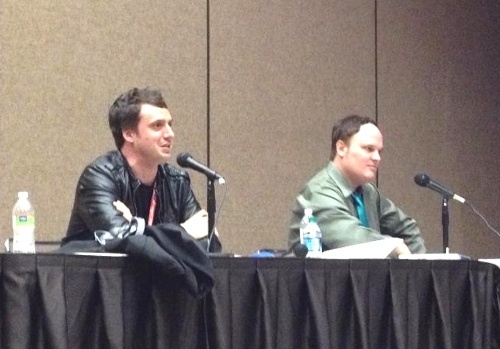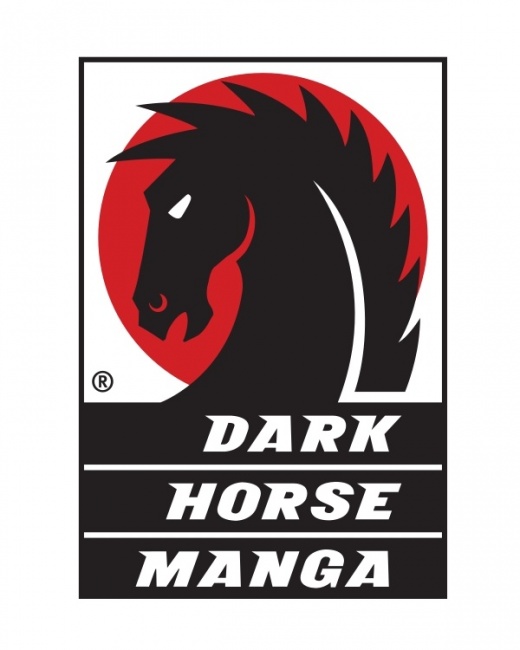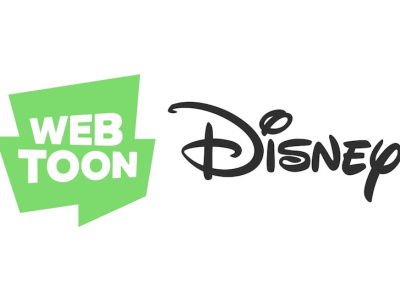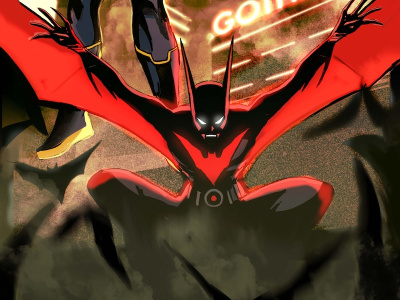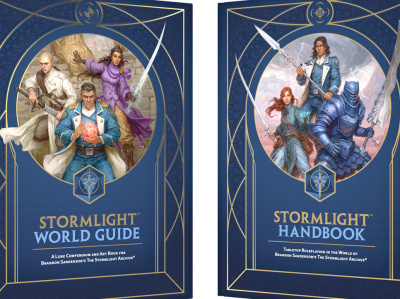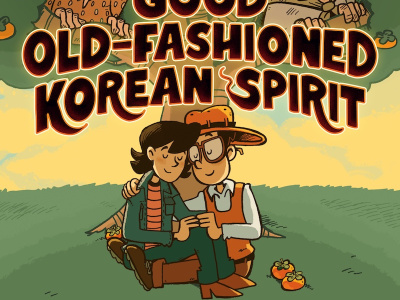We recently caught up with Dark Horse Director of International Publishing and Licensing Michael Gombos and Manga Editor Carl Horn to discuss the state of the manga market in North America. In Part 1 of our two part interview, we discuss sales in the book channel, comic stores, and digital, with additional insight from Vice President--Trade Sales Michael Martens. In Part 2, we talked about piracy, the impact of streaming, the growing Hollywood pipeline, and Dark Horse’s 2016 releases.
What’s your assessment of the manga market in 2015?
Horn: It certainly did very well for us. It’s quite evident that manga has continued its recovery. It’s come back, in some ways, on a firmer footing.
How have manga sales been in the comic store channel?
Horn: One of the things that’s changed… the manga boom in the 2000s was strongly associated with shojo manga and bringing in more female readers, but if you look at some of the most popular manga selling today, Berserk, which is certainly one of our bestsellers, titles like Attack on Titan or Tokyo Ghoul, these are quite dark series. They’re very violent, they’re full of action. They have a strong readership across both male and female readers. It also means there definitely is more interest in darker and more violent tales right now. This impacts the direct market, I believe, because the direct market is more associated with crossover with comics readers. You might say that darker stuff is perhaps more associated with American comics.
We can see, in some cases there are very sharp divides between the way a certain manga title might sell in the direct market and in the book market. For example our bestselling manga title by far, was Unofficial Hatsune Mix, but I would say less than 10% of its sales were in the direct market and 90% were sold in book stores. This may be because Unofficial Hatsune Mix is a very cute, light title and it may have more appeal to the "manga fans," to more dedicated fans of Japanese pop culture in general than to people perhaps who are crossover readers of American comics. On the other hand, a title like Berserk or Gantz would have much more balanced sales between the direct and book store market because these are titles which are closer perhaps in feel and style to what people recognize in American comics.
Gombos: To add to Hatsune Mix though, it’s a title that’s been able to sustain its sales. It was our bestselling title in January 2015 and January 2016.
Horn: A title like [Unofficial Hatsune Mix], is kind of like a passport title. It gets people in who haven’t seen it before. People who have never heard of Dark Horse were buying this book because they’ve heard of [Hatsune] Miku. So if you want to get more people into your comic store, it would be a great thing to show people that you know what time it is.
Was there any difference between the growth in the book and comics channels in the past year, or did they grow at about the same rate?
I think the book store channel grew a little faster. We’re still processing the benefits of our switch to Random House, which we did in 2014. Book displays have grown in Barnes & Noble; you’re seeing more manga being displayed face out.
Are you getting any titles into mass?
Horn: We are going to start doing that with an experiment with Random House later this year.
You’ve had some non-manga material, in mass before, right?
I believe so, but we are going to try it with manga.
What do you have going on with digital?
Horn: Digital has never been one of our biggest sectors for manga. Our biggest titles for digital are video game-related titles and pop culture titles like Buffy. Having said that, there is demand on certain back catalogue titles for example, Lone Wolf and Cub. Lone Wolf and Cub might be more convenient to read digitally because it’s 20 volumes, 300 pages each. A title like that it might be a sheer matter of saving your wrist strain to read it digitally.
I would say our digital in manga has held steady. We do our best to expand the availability of our titles, but print is still very much in the lead when it comes to manga.
We’re basically selling you a different type of product. The movie, television and music industry, their stuff is already an all-digital format. Books are inherently an analog format. They’re a piece of merchandise and we consider that when we are manufacturing our product--our cover stock.
Looking at 2015, are there any titles that surprised you by performing better or worse than expected?
Horn: A big surprise was the Kurosagi Corpse Delivery Service. We’re about to go into our third printing in eight or nine months. This is a title that has struggled as a regular series, volume to volume. We sold more of the first printing than we sold of any individual volume.
Are you omnibizing that now?
Horn: Yes. This is a title that we’ve began 10 years ago and it’s been struggling in sales, but we went omnibus with it and all of a sudden we’re in the third printing of it. It’s gathering a whole new life and a whole new readership. I would have been satisfied if the first printing of the omnibus sold but now we’re about to go onto the third printing.
Gombos: Another surprise is we can’t keep Berserk in print. It’s selling nonstop. It’s always been a great seller it’ll probably hit a million volumes in print soon. But ever since we switched to Random House, it’s constantly on the reprint list and it’s exploding. Just like Kurosagi Corpse Delivery Service. I can’t say it’s entirely because of Random House, maybe just people decided to pick up Berserk. It’s an investment when it comes to a series because it’s almost 40 volumes long and each book is $15.00.
People like paper, and I’d like to note that from the licensing perspective, a lot of Japanese publishers like Dark Horse’s commitment to paper. I know that sounds weird. Maybe it’s something old-fashioned, maybe it’s something more traditional, but the fact that we stress how we want to sell our paper books and not digital and our fervor for the paper book lends itself a lot to negotiating and licensing.
Horn: It’s really astonishing. There’s little niches like Scandinavia crime novels and so forth, but there’s no section that compares to manga. There’s no section of French or German books translated into English. Only the Japanese have managed to create a section in bookstores across America. You’ve taken this bit of pop culture that’s been created by a very different culture and you’ve held this space for it in the American bookstore market and expanded it gradually. That’s quite an achievement. It always goes back to the fact that, to this day, with all the development of the American manga market. They’re not made for the Americans, they’re made for the Japanese. They don’t really think about the American readers. It’s rather extraordinary that this has been able to build this share in America.
Editor’s note: Separately, we spoke to Dark Horse Vice President Trade Sales Michael Martens to find out more about the sales trends. Asked how the expanded rack space at Barnes & Noble (see "Barnes & Noble Adds New Release GN Displays") has affected sales, Martens said "The Barnes & Noble re-lay has definitely upped our sales on all our books, but the manga have done especially well. It’s been really good for us."
But that’s only part of the picture, Martens told us. "We’re doing really well overall with manga, with both frontlist and backlist," he said. "Manga is coming back really strongly." Martens confirmed that Unofficial Hatsune Mix, Berserk, and the new omnibus editions of Kurosagi Corpse Delivery Service were all selling very well, with initial placement over five times the best placement on one of the individual volumes.
Martens confirmed that the types of books that are selling had also changed. "Shonen is doing better," he noted. Asked why he thought that was happening, he pointed to overall trends in geek culture, in which female readers are reading more American comics, which may be affecting tastes and their interests in manga. Exposure to geek action fare in TV and films is also an important factor, Martens argued. He also noted the convenience of the omnibus format, suggesting that it’s a lot more convenient for an older buyer who may not be visiting comic stores as often and isn’t a big buyer of individual trade paperbacks.
Click here for Part 2.
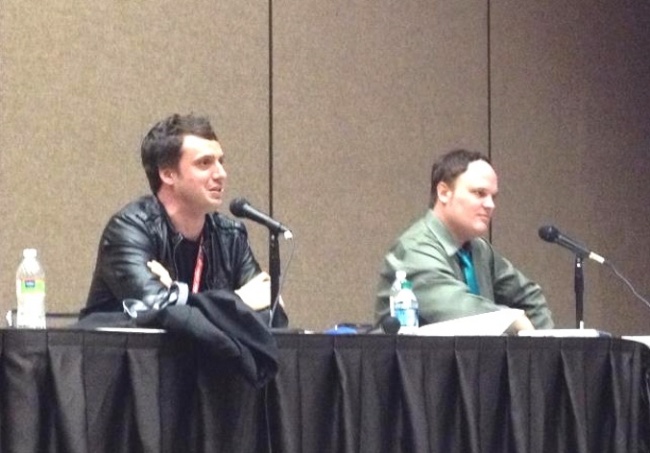
Manga Sales Are Growing and Changing
Posted by Milton Griepp on March 2, 2016 @ 3:44 am CT
MORE COMICS
To Bring Marvel, Star Wars, Disney, and 20th Century Studios Comics to Webtoon Platform
August 13, 2025
The deal will bring comics from the Disney, Marvel Comics, Star Wars, and 20th Century Studios brands to the Webtoon platform.
Pairing Neo-Gotham's Batman with Dakota City's Static
August 13, 2025
The series teams up Terry McGinnis, the Batman of Neo-Gotham, and Virgil Hawkins, Milestone’s Static.
MORE NEWS
For 'Cosmere Roleplaying Game'
August 13, 2025
Brotherwise Games will be launching the Cosmere Roleplaying Game: Stormlight series.
New Graphic Novel by Creators of 'Banned Book Club'
August 13, 2025
Kim Hyun Sook and Ryan Estrada, creators of the Eisner-nominated Banned Book Club, are back with a lighter take on rebellious teens, meddling elders, and Korean traditions.



